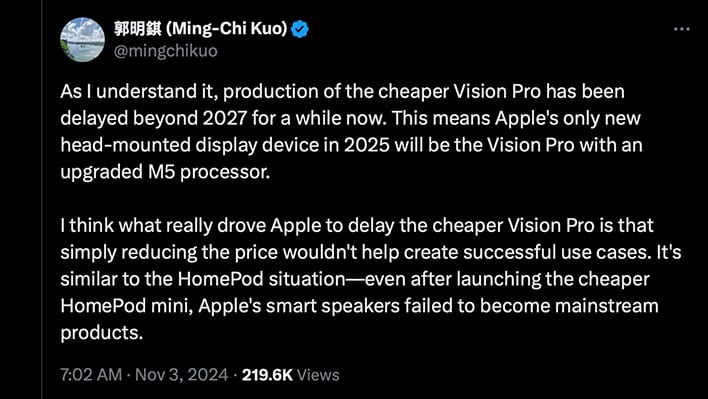Apple Analyst Drops Bombshell On When To Expect A Cheaper Vision Pro
Well-known Apple analyst Ming-Chi Kuo has just revealed that Apple will continue on its Vision Pro journey, but with some caveats. The expected cheaper version of the device likely won't be coming until after 2027, which would have soothed the biggest complaint about the headset.
Apple does plan to potentially launch an upgraded M5 Apple silicon version of the device in 2025, but obviously that won't bring the kind of cheaper price tag that holdouts are hoping for. A cheaper device may not convert users of traditional computing to what Apple has touted as spatial computing, it seems.

As an owner of the Vision Pro, I share the mixed feelings about the device. While the technology is impressive, it does not compel me to use it very often. Its biggest selling point is likely its immersion in watching movies, but its $3,499 MSRP is too steep to justify it for such a narrow use case.
To be fair, I had a similar experience with the Meta Quest 3, but that device has a price that is easier to stomach. The issue here is that VR is not likely ready for mass adoption in the way Apple or Meta wanted it to be. Comfort issues, together with an entirely new spatial computing ideology make it harder to integrate.
With Apple focusing on updating the high-end Vision Pro with the M5 chip, it may actually be a good thing in the long run. The device will continue to be niche, but at least pack the appropriate technology to showcase its capabilities. Perhaps after this period, it will have a more developed and polished product that can translate to a cheaper Vision Pro. Only then does mass adoption seem more likely, but due to VR's very nature, it may never quite be like the mobile phone revolution was.
Apple is driven by the customer experience, but it's also driven by sales. Low sales of the Vision Pro may be close to the limit which Apple is able to tolerate, to justify more or less research spending on the platform.

